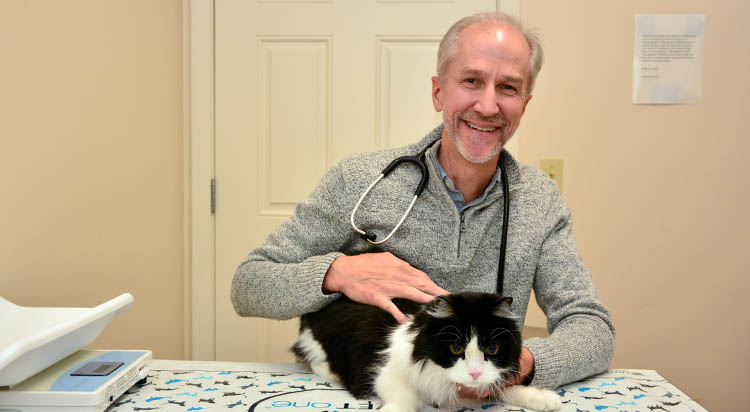Senior Cat Care
Growing Older with your Cat!
With a focus on wellness and preventive care, the doctors and staff of Portsmouth Veterinary Clinic are here to help you and your beloved cat through every life stage, and to support you when your cat reaches their senior years. Just like us, cats are prone to illness and physical challenges as they age, but many of these problems are manageable with medication, treatments and careful monitoring. Education about senior cat challenges, diseases and observation can be a huge help in keeping your cat happy, healthy and comfortable through their golden years.

Senior cats can be just wonderful. It is comforting to see a senior cat curled up sleeping soundly, or stopping by for some extra loving. They capture our hearts more every year that passes.
Age-related diseases and chronic illnesses are a part of living with an older cat. Early diagnosis and treatment of these illnesses is critical to your cat’s long-term health and quality of life. Many conditions can be prevented from progressing into more serious illnesses when detected early and managed properly. Once symptoms appear, the conditions may be too difficult or costly to diagnose and treat. Our goal is for you and your cat to enjoy the longest, healthiest life together.
Changes You May see in Your Cat
Because cats age more rapidly than people, dramatic changes in health can occur in as little as 3 to 6 months. If you notice any of the following signs, we recommend you schedule an appointment to have your cat evaluated:
- Weight loss
- Decrease in appetite
- Bad breath or drooling
- Increased appetite, especially if accompanied by weight loss
- Rough appearance to cat’s hair coat
- Increased vocalization or frantic behavior, especially if accompanied by a ravenous appetite
- Excess urination
- Increased water intake
- Decreased activity level, increased stiffness or difficulty grooming
- Apparent pain when your cat moves or is handled
- Sudden tendency to bite or jump from your lap when you brush or pet your cat
- Any vomiting, abnormal stool or decreased frequency of bowel movements
- A new lump or growth, especially if it appears to increase in size quickly
- Depression or listless behavior
- Increased respiratory rate or open mouth breathing
- Coughing
Keep Your Senior Cat Healthier
The Senior Cat Health Exam
When cats enter the senior years, regular semi-annual health examinations are more important than ever. During your cat’s senior health exam, we will:
- give your cat a complete physical examination
- ask you a series of questions regarding any changes in your cat’s activity and behavior
- Perform a complete physical exam and recommend a senior panel blood chemistry test. The senior panel blood test includes a complete blood count (CBC), electrolytes, enzymes and chemical elements such as calcium and phosphorous. This information helps us determine how various organs, such as your cat’s kidneys, pancreas, and liver, are currently functioning. The results of these tests help us formulate an accurate diagnosis, prescribe proper therapy, and monitor the response to treatment.
- A blood test to check for hyperthyroidism, a common ailment in senior cats.
- We may recommend further testing based on the results of these tests. These include heartworm tests; feline leukemia/feline immunodeficiency virus test in cats; blood pressure evaluation; urine protein evaluation; cultures; imaging such as x-rays, ultrasound, and echocardiography; electrocardiography, and special ophthalmic evaluations, among others.
Keeping your Senior Cat Comfortable
There are many ways to make small adjustments in your cat’s life style and environment that can help keep them comfy as they age. We recommend providing comfortable bedding to give their aging joints a soft place to rest. Because older cats cannot regulate their own body temperatures as efficiently as they once did, they gravitate toward warmth. Heated cat beds can also be purchased. Be sure their bed is out of the path of any draft, and provide an extra blanket or two, both in the bed and on any other favorite napping spots. If your cat’s vision is deteriorating, a nightlight will help her navigate in the dark, and a radio playing on low volume will remind them they are not alone. Because older cats are also are extra sensitive to humidity and heat, keep them indoors and away from conditions that could cause heatstroke. Perhaps your cat likes to jump from one surface up to another. Make it easier for them to get to their favorite places and avoid unexpected falls by adding steps or platforms at a variety of heights help them gracefully get where they need to go. Discuss adding glucosamine, fatty acid supplements, prescription medications, or alternative therapies with our veterinarians to further aid in keeping your senior cat comfortable.
Exercise and your senior cat
Your cat needs exercise is to stay healthy! You should definitely keep them moving as they get older. Be sure to monitor your senior cat closely as they exercise, keeping in mind that they may not be able to physically handle as much exercise as before. Using toys is often the best tactic to exercising your cat, especially small toys your cat can chase. Use your imagination! Play hide and seek, hide and let your cat find you. Or play tag—they will quickly catch on to the game of “finding you”. Definitely keep them as active—mentally and physically—as possible. Exercise helps your senior cat maintain a healthy body weight, helps to keep your cat’s senses sharp and can help keep their muscles and joints strong. Cats may be affected mentally as they age, and just like with people, keeping your cat’s mind active by incorporating regular exercise in their daily routine can slow down cognitive changes in your cat.
Please consult with us before embarking on any new exercise plan with your senior cat. We will discuss with you what type of exercise is safest for your senior cat, how frequently we recommend the exercise and for how long it should be done. If your cat appears reluctant to continue exercising, please do not force your cat to continue. If your cat displays any changes in behavior such as tiring more easily, coughing while exercising or having trouble breathing, please call us.
Feeding your Senior Cat
Selecting the appropriate diet for your senior cat is very important! The best food for your senior cat depends upon his or her age, health status, weight and breed. Fresh water should always be available, you may consider a drinking water fountain Obesity is a very common problem of older cats, and should be taken seriously. It can lead to a number of health problems and increase the risk of age-related diseases your senior cat is susceptible to including heart, liver, kidney or joints disease. Please be sure to discuss nutrition with us at your cat’s health examination.
The entire staff at Portsmouth Veterinary Clinic is here to help you and your cat through every life stage. Please contact us to schedule your cat’s senior wellness exam and with any questions you have about your cat’s healthcare.

